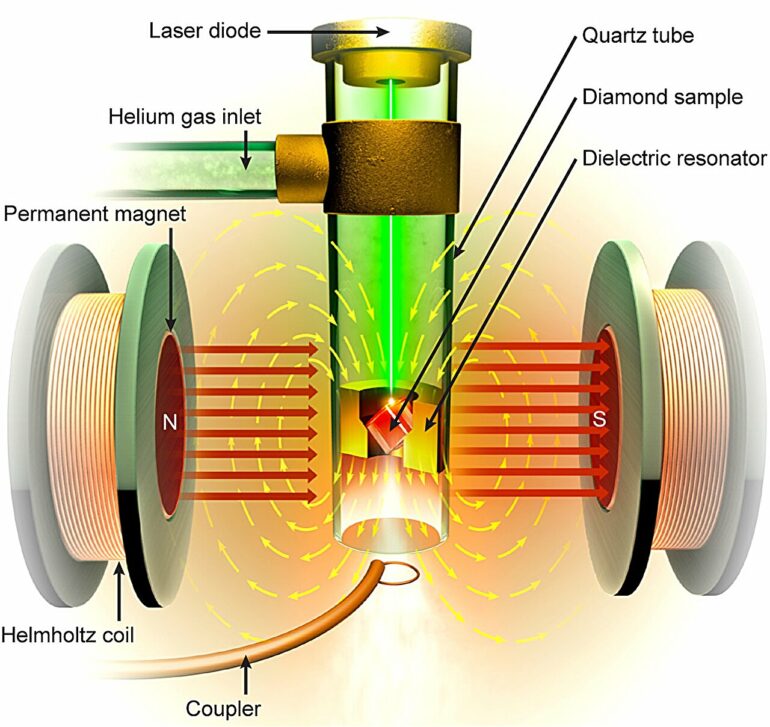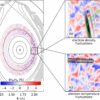UNSW engineers have developed and built a special maser system that boosts microwave signals—such as those from deep space—but does not need to be super-cooled.
They say that diamonds are a girl’s best friend—but that might also soon be true for astronomers and astrophysicists following the new research. The team of quantum experts have developed a device known as a maser which uses a specially created purple diamond to amplify weak microwave signals, such as those which can come from deep space.
Most importantly, their maser works at room temperature, whereas previous such devices needed to be super-cooled, at great expense, down to about minus 269°C.
The amplified signals, originally emitted by pulsars, galaxies, or very distant spacecraft, could ultimately be crucial for expanding our understanding of the universe and fundamental physics.
The UNSW research team, led by Associate Professor Jarryd Pla, have published their findings in the journal Physical Review X, describing how a so-called spin system within the diamond can boost weak signals at room temperature.
“The microwaves enter the device and then the spins inside the diamond create copies of them, which in effect amplifies the microwave signals. Ideally, the microwave signals then come out much larger and with very little noise on top,” A/Prof. Pla says.
“Currently, electronic amplifiers are being used to detect signals from very distant spacecraft like Voyager 1 which is now more than 15 billion miles away from earth, but still sending out data.
“Those amplifiers are cryogenically cooled to reduce what is known as thermal noise, which is random electrical noise generated by the motion of electrons in the amplifier’s components. Otherwise, that noise would just overwhelm the signals being received.
“Our room temperature solid-state maser amplifier avoids all the complication and cost of having to cool everything down to extremely low temperatures and is also much more compact.”
In the paper, the researchers show their maser system can boost signals by a factor of up to 1,000.
Nitrogen vacancy center spins
The proof-of-concept maser developed by the UNSW team, which also includes Mr. Tom Day, lead author on the study, works by growing a diamond in a lab which contains imperfections known as nitrogen vacancy (NV) centers.
This NV is a deliberate defect where a nitrogen atom replaces a carbon atom next to an empty spot in the crystal structure, thereby creating a spin system.
When the spin system is placed inside a magnetic field and simultaneously exposed to a strong green laser beam, it is able to amplify incoming microwave signals..
As well as applications in space exploration, the room-temperature maser could also be hugely beneficial in defense applications, such as radar.
Radars work by sending out electromagnetic signals, which bounce off objects and return to the radar to provide information about the objects’ location, speed, and size. Being more easily able to detect and boost weak signals would therefore potentially be very useful.
Purple reigns
The research team acknowledge that further developments are needed to reduce noise in their maser system, but believe a commercial device could be operating within two to three years.
They are investigating the effect of increasing the concentration of NV-spins inside the diamond, as well as improving other components of the system, such as the resonator that the diamond sits in.
Discover the latest in science, tech, and space with over 100,000 subscribers who rely on Phys.org for daily insights.
Sign up for our free newsletter and get updates on breakthroughs,
innovations, and research that matter—daily or weekly.
“In effect, we need to make the diamonds more purple,” says Mr. Day.
“The purple color is actually caused by red light emitted by the NV centers. Making darker samples means more NV centers, which ultimately produces higher levels of gain and lower levels of noise and makes the amplified signals clearer.
“However, if you grow these diamonds with very high densities of NV centers, then you can get unwanted defects, so that’s a materials engineering problem that we’re solving.”
A/Prof. Pla adds, “To be competitive against the current cryogenic amplifiers in terms of the low levels of noise then we know we need to boost the NV concentration in the diamond even further. And we think there is quite some way we can go, potentially up to an order of magnitude improvement there.
“We are also working with manufacturers from France and Japan to produce better resonators and we estimate that could also improve the noise by quite some margin.”
More information:
Tom Day et al, Room-Temperature Solid-State Maser Amplifier, Physical Review X (2024). DOI: 10.1103/PhysRevX.14.041066
Provided by
University of New South Wales
Citation:
Purple diamond maser could one day amplify signals from deep space (2024, December 19)



